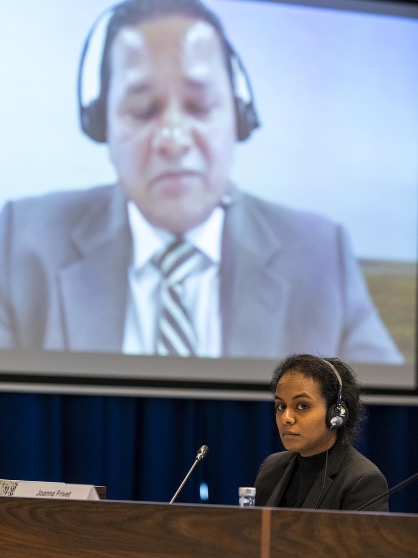The Hague, September 13, 2022 – In an unprecedented effort to achieve justice for the killing of journalists, three leading press freedom groups launched a People’s Tribunal in November 2021 to hold governments accountable. After three case hearings in Mexico City and the Hague, the independent Panel of Judges will pronounce its judgment on 19 September in the Nieuwe Kerk, the Hague. This judgment responds to the Prosecution’s indictment of the governments of Mexico, Sri Lanka and Syria. Register here for the hearing, or follow the livestream.
The Panel will in particular present its verdict in the three emblematic cases brought forward by this Tribunal: Mexico (the case of journalist Miguel Ángel López Velasco), Sri Lanka (the case of journalist Lasantha Wickrematunge) and Syria (the case of journalist Nabil Al-Sharbaji).
Faced with persistent impunity in more than eight out of ten cases involving the murder of a journalist, this People’s Tribunal was set up by Free Press Unlimited,the Committee to Protect Journalists, and Reporters Without Borders to hold states accountable for their failure to protect journalists and investigate crimes against them.
Participants in the closing hearing will include three members of the High Level of Legal Experts on Media Freedom: Baroness Helena Kennedy, Nadim Houry and dr. Chile Eboe-Osuji. The High Level Panel which also includes Amal Clooney, advises the Media Freedom Coalition and is now leading the way for proposals to conduct and support investigations into violence against journalists worldwide.
The Tribunal has brought forward unique evidence, including cell site data implicating the involvement of Gotabaya Rajapaksa, president of Sri Lanka until July 2022. Key experts such as Mexican investigative journalist Anabel Hernández, 2021 Nobel Peace Prize laureate Maria Ressa, and one of Syria’s most renowned human rights activists Mazen Darwish have also contributed key evidence in the form of witness testimony, joined by (former) police inspectors and prosecutors, representatives of the United Nations and the High Level Panel of Legal Experts on Media Freedom.
Moreover, the Tribunal has offered a platform for the relatives and colleagues of journalists murdered in reprisal for their work. Ahimsa Wickrematunge, the daughter of Lasantha Wickrematunge, stated after the Sri Lanka case hearing: “This trial was the closest our family have ever come to having our day in court and it has given our family renewed hope, courage and strength to keep fighting”. The hearings reached over 24,000 people worldwide, and led to public endorsements and new initiatives in all three cases.
The Tribunal operates in the tradition of the Russell Tribunals in collaboration with the independent Permanent Peoples’ Tribunal (PPT). People’s Tribunals are designed to hold states accountable for violations of international law by building public awareness and generating a legitimate evidence record, and play an important role in empowering victims and recording their stories. Their judgments are not legally binding, but aim to contribute to accountability through documentation and public testimony. International human rights lawyer Almudena Bernabeu from Guernica 37 International Justice Chambers has led the Prosecution of the Tribunal.
The Closing Hearing will take place from 13:30-18:00 CET on 19 September in The Hague. The hearing will be livestreamed, with translation available to Spanish and Arabic. To attend in person, register at https://www.freepressunlimited.org/en/closing-hearing-peoples-tribunal-murder-journalists or tune into the livestream on the Tribunal website.
Ruth Kronenburg, Director, Free Press Unlimited:
“Many of the witnesses have referred to the hearings as a unique platform, because it shows that the murder of their loved one is not forgotten. With the Tribunal, we wanted not only to set an example for states, but also to provide a platform for anyone affected by the unsolved murder of a journalist.”
Christophe Deloire, Secretary-General, Reporters without Borders:
“Our initiative goes beyond simply naming and shaming authorities who both allow and benefit from an alarming level of impunity for crimes against journalists. It’s about setting a concrete and practical example of what should be done by an effective and independent judiciary.”
Jodie Ginsberg, President of the Committee to Protect Journalists:
“When the murder of a journalist goes unpunished, it fosters a toxic environment in which threats to society can flourish. The People’s Tribunal is a meaningful way to demand justice for journalists whose judicial systems fail them.”
Hatice Cengiz, witness of the Tribunal and widow of journalist Jamal Khashoggi who was murdered in 2018:
“The world needs to know the real facts and needs to act decisively to protect the free press. Something like this event encourages all of us against these killers to not stop.”
